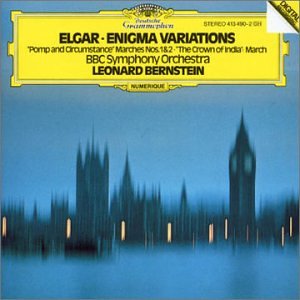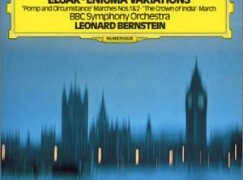Bernstein riles the BBC
mainElgar’s Enigma Variations was possibly Lenny’s worst recording. His relations with the BBC Symphony Orchestra trumpet section may have contributed to the disaster.

‘This is supposed to be our music,’ mutters one of the players.
The same section of the BBC Symphony Orchestra showed equal resistance to Pierre Boulez. Read player’s account here.






You’ve known way too few trumpet players, Norman. They’re all like that.
And don’t get me started on trombone players!
And they are amateurs next to tuba players! There’s a story about this particular recording: throughout the rehearsals Lenny kept turning up late (hours late, not just minutes), to the mounting annoyance of the players, and they finally took matters in their own hands. At the end of the final rehearsal, a little delegation led by their tuba player (James Gourlay, I believe), came up to Bernstein with a box wrapped up with a bow, and told him they wanted to give him a little gift in appreciation. Bernstein opened up the box to find an alarm clock in it! His response was as predictable as it is unprintable.
Despite the fact that there really was no love lost between Lenny and the BBC SO, their Enigma is a recording I’ve always liked – it’s always interestingly different, and as wrong-headed as it might be to many, the BBC SO’s playing fizzes and seethes with life from start to finish.
I disagree. Last summer I was driving up along the Hudson and I happened to turn on the radio to the “Enigma”, just three or four minutes in. Ten minutes later I thought to myself, “This is the greatest interpretation of this piece I’ve ever heard.” A few minutes later, I thought, “This must be the Bernstein, that everyone makes jokes about.” It was the Bernstein.
Indeed this is simply a sublime interpretation.
It may not be the ‘best’ recording ever but it’s a sincere interpretation by a top notch musician and thinker.
His worst? You’re joking…or deaf. It may not be Boult, Barbirolli or Monteux, but it’s a beautiful interpretation that’s different, fresh and deeply felt. I love it. For his worst, take your pick: Tchaikovsky 6th on DG, Mahler 1 on Columbia, West Side Story on DG, or even worse, La Boheme.
Agree about the Tchaikovsky and Mahler 1. I must respectfully disagree regarding West Side Story. It has major problems but overall it commands respect in my opinion. Never heard his La Boheme. Is it that terrible? As for his Enigma recording I’ve enjoyed it for any years but the gold standard recording has always belonged to Boult. Then again who am I to talk. I tried conducting and was a complete disaster.
Not Barbirolli?
I meant the Boult is the gold standard in my opinion. Didn’t intend to sound like I was stating a fact. I adore the Barbirolli. Perhaps the Boult is so cherished because it’s the one I grew up with. As for the the Bernstein I just listened to it again and although it is somewhat unusual there are many positive moments. The sound on the DVD performance is much better than the cd. Agree?
Monteux.
I disagree. Bernstein takes Nimrod at the right tempo. Most conductors go too fast and miss the point.
Tempo is always relative. Even so, Elgar takes three and a half minutes over it at the tempo he marked. Bernstein makes the music drag – it sounds too slow and is too slow.
To me, a typical Bernstein trait. Some of his tempi in the Mozart Requiem (I’m thinking the Lachrymosa in particular) are abysmal. Of course, he can go off the rails in the other direction as well (think Shostakovich 5, finale).
All of that said, I grew up in the era in which Lenny was a titan in the field, primarily because he brought great music to the masses, or at least galvanized youngsters like me.
His slow tempi tended to be very slow; his fast ones, very fast. In the concert-hall, one didn’t mind this as much as one does on recordings. There was such sheer emotion in his performances that he brought off the occasional eccentricities of his interpretations. I could compare this to Charles Munch, whose performances were not always technically perfect, but so rousing; so moving.
What Elgar? His electric recording of Nimrod is not even close to three and a half minutes. It’s exactly 2:52. [Score shows quarter note (crotchet) 52. His acoustic IS 52 (but cut), the electric 48 more or less.] Even fastoso Toscanini’s 1952 recording of Nimrod runs 3:16, slower than the composer’s own.
Not that I mind a good wallow once in awhile. I can understand and enjoy Bernstein’s indulgence when in the right mood.
Yes, you’re right, which makes the Bernstein version seem utterly ludicrous and sentimental – it is not meant to be a dirge.
I could never fogive the nasty bullying he gave to Jose Carreras in the filming of the recording of West Side Story, ugh.
What bullying? Carreras arrived completely unprepared. The treatment was uncomfortable to watch, but fair.
Completely agree, he’s supposed to be a professional, one would accept at the very least he had learnt the music and sorted some of the pronunciation out.
It’s always dangerous when a nation feels that it has ownership over its own culture. Music is for the whole of humanity. It isn’t for the Germans to say, “Bach belongs to us”, or for the Poles to say, “Chopin is ours”, or for the Russians to say, “Tchaikovsky is our music”. Art belongs to all of us equally.
Norman is incorrect about what the trumpet play says. It’s not “our music” but rather a sarcastically “I must be unmusical…” because he doesn’t hear what Bernstein heard.
Lenny could have been far more tactful. It’s dangerous for conductors to sing a characterization of how someone played something; it always comes out as an ugly exaggeration and inherently disrespectful. And for him to ask “don’t you hear the difference?” also comes across as disrepectful.
In my long experience as an orchestra musicians, I’ve found that musicians will try to do most anything a conductor asks, especially one of Bernstein’s stature. But they don’t like being talked down to, or picked on. And, at some point, there will be blowback.
Menuhin (a pretty good Elgar interpreter) loved Bernstein’s reading. While it wouldn’t be my lone Desert Island Enigma (Monteux or Barbirolli, maybe Andrew Davis if I’m going digital) it is in its own way indispensable.
Just queued it up for a relisten. Wow. What can you say? He makes it his own.
My only regret is that the old Lenny didn’t make this record, the Lenny who still had Felicia in his life. He would still have had the charm, the tact, the diplomacy, the charisma to sweep the BBC SO off their feet and make this most English of works his and theirs for all time.
It seemed to me that the BBC Symphony had one of the weaker London trumpet sections. I don’t know how many concert recordings I’ve heard where there was some sort of problem in the section.
The passage improves after Bernstein’s cajoling/persistence.
(a) Conductors in general — not just famous ones — are tactless, abrasive, a-holes. Expecting a conductor to be “nice” is like expecting an attack dog to bark more gently.
(b) Ditto for trumpet players. Playing the trumpet requires a LOT of self-confidence; I don’t know if the nature of the instrument attracts cocky abrasive temperaments, or creates them.
(c) At the beginning of this clip, the trumpet section is not sounding good. Bernstein singles out the 2nd trumpet, and then they sound better. Naturally it is the 2nd trumpet who gets angry. I’m not sure what the reasoning is behind that “It’s supposed to be our music” remark — it sounds to me like he’s saying “we should be able to play bright, unbalanced, and out of tune if we want to.”
(d) As an orchestral player, your job is to do what the conductor wants, to the best of your ability. You don’t get to decide tempi, dynamics, balance, articulation, any of it. If that bothers you, you need to rethink your attitude or your career choice.
His worst recordings: Mahler 5 and Schumann symphonies (both with VPO).
His best (on the top of my head): Haydn Missa in tempore belli (Columbia and Philips), Ravel Sheherazade with Marilyn Horne (incredible recording), Schumann symphonies with NYPO, Mahler 2nd with LSO (although not as good as Mehta), Mahler 3rd (DG), Mahler 6th (DG), his recordings with Rostropovich in Paris for EMI, Beethoven Fantasia op. 80 with Serkin, Brahms Serenade #2, Mozart Great Mass (Auger and Von Stade are in heaven).
You must be kidding. His Mahler 5 is one of the greatest recordings of that symphony ever. Is it not perfect? yep, it isn’t perfect AT ALL! But there’s so much music and emotion that other illustrious conductors don’t even get close to get, even when theirs are absolutely perfect recordings. I learned to love Mahler’s music with that recording. I’m glad I heard that one and no others.
It’s Iaan Wilson on trumpet who comments in response to Bernstein I believe – that (wearily) “we’re basically unmusical” rather than “it’s our music”?
I was at the concert in the Festival Hall….it was sensational…..The Nimrod was slower than on the recording….It was a gut wrenching interpretation….
I agree. I cherish the DVD of the performance that ICA released a few years ago – it’s quite something. An interpretation people either love or hate!
I didn’t realise the very very early early digital CD had a filmed version as well! The sound quality is poor full stop. But the famous Lenny lengthening out of adagios seems to work here in the famous tune – when it appears.
The BBC players should be ashamed of themselves. “This is our music” – yeah….